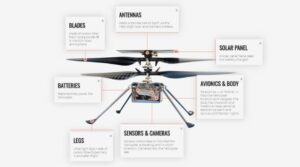Good news from Mars! NASA just received the first report from the Ingenuity Mars Helicopter, so we know what’s really happening up there.
According to the report, everything is operating as expected, meaning both the helicopter and its base station run smoothly. The helicopter landed at the Jezero Crater on February 18 and began one of the most challenging quests ever seen.Â
Here is what you need to know.
The Mars Helicopter’s First Report Details
NASA engineers needed to be sure everything works well on the Perseverance rover. That includes the Ingenuity Mars Helicopter, too. Luckily, we have the first report!
Ingenuity needs a lot of stored energy to run as expected. That includes heating and maintaining vital functions, while its optimal battery health is right on track. All of these are currently running as planned.
Tim Canham, the operations lead of Ingenuity Mars Helicopter at JPL, released a statement discussing the rover’s positive status. He said:
“Both appear to be working great. With this positive report, we will move forward with tomorrow’s charge of the helicopter’s batteries.”

What Happens Next to Ingenuity
A one-hour power-up will enhance the rotorcraft’s batteries to around 30 %. The batteries will then have to reach 35 %, following more charging sessions weekly – Ingenuity will be still attached on Perseverance.
The new data from the next charge is significant. NASA will compare it to the battery-charging sessions made during the trip to Mars. That will also offer more details to plan future charging sessions.
Currently, the six lithium-ion batteries get enough recharges from Perseverance’s power supply. But, when the Mars Helicopter will begin its mission, its batteries will get the power from a solar panel.
NASA believes Ingenuity will survive the bone-chilling Martian nights successfully. Completing such a task will bring the project’s goals to a 90 % status achievement!
Ingenuity’s descendants could offer even more high-definition data and surveillance for humans or robots. And maybe the areas that are so difficult for rovers to reach could be finally just a bad memory.













Leave a Reply